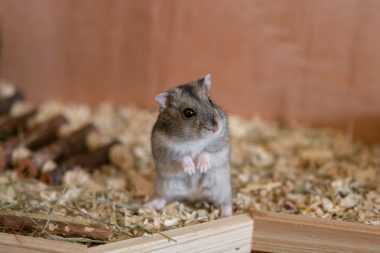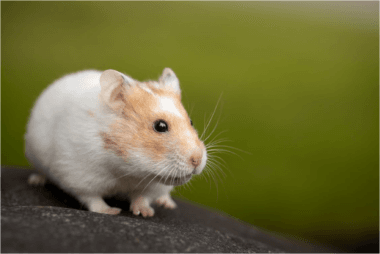Are you considering getting a hamster? Their ease of care and cuteness makes them very popular pets. In fact, hamsters are the perfect first pets for small children. Parents use these cuddly creatures to teach responsibility. However, their small size and low maintenance requirements does not mean they don’t face health issues.
A common issue hamsters face in quivering. When you see this behavior for the first time, it may alarm you. You might even wonder ‘why is my hamster shaking and having trouble walking?’ Your search for answers will leave you puzzled because it’s difficult to figure out what’s wrong with your pet hamster. Unlike dogs, hamsters don’t have tails that wag or vocal cords to make barking sounds. This makes it very difficult to determine how your hamster might be feeling.
A hamster keeps busy either running on the wheel at night, scrounging for food, or sleeping. The first possible signs of an ill hamster are sleeping too much, not eating, difficulty walking, and shaking. In addition, a hamster is vulnerable to many illnesses like eye infection, wet tail, and fur loss. That’s why it is important that you keep observing your pet for odd behaviors.
In this blog, we will talk about a specific type of illness. One that causes convulsion-like behaviors. Sometimes the agitation also affects the hamster’s ability to walk. So why is my hamster shaking and having trouble walking?
Shaking is triggered by many reasons. In this blog, we will examine the five biggest reasons for this behavior.
6 Reasons Why My Hamster Is Shaking and Having Trouble Walking
As a pet parent, it is your responsibility to determine the root cause of your hamster’s jittering. A few reasons point to simple causes but there are certain instances where the shaking points to a life-and-death situation. Unless you are a licensed veterinarian, you need to take your hamster to the vet immediately.
1. Shaking triggered by anxiety and fear
Like humans, hamsters shake when faced with a nerve-racking or frightening situation. These tiny fur balls are prone to startling. In fact, everyday occurrences may trigger the shaking response in a hamster.
You might expect this behavior when you first bring your hamster home. Your furry pet will tremble and shake in your palm. However, with daily handling and care, your hamster baby will get accustomed to your smell and touch. Keep in mind, this will occur gradually. Similarly, if new people come around or handle your hamster, it may tremble out of fear.
Knowing that hamsters have a skittish nature, you should gradually introduce your hamster to new people. Like small children, hamsters feel comfortable around their caregivers. If your hamster shakes when it is introduced to new people, avoid touching it. It will immediately put your pet at ease.
Why is my hamster shaking and having trouble walking?
There are multiple reasons that can trigger anxiety in a hamster such as:
- Introduction to new people
- Modifications in its environment eg. new cage or new bedding
- Rescued from an abusive home
- Not fed during previous care
Luckily, there are some things you can do to curb your pet’s fear. When you bring your fur ball home, let it take time to adjust. Leave it alone for one to two weeks. This will help it get comfortable in its new home. Hamsters cannot see well. They try to learn the layout of the cage to move around with ease. You should only approach its cage when you’re filling its food bowl, changing the water, or offering treats.
Never force the hamster to interact or play. Avoid exposing them to bright lights or loud noises.
After the two-week mark, if your hamster is not showing signs of fear or anxiety, you may start interacting with it. Start slowly. Let it become familiar with your scent. This will help you earn its trust.
2. Shaking brought on by hibernation and climate.
Seasonal and weather changes can also trigger shaking in your pet hamster. Once the ambient temperatures become cool, a hamster will hibernate and change into low energy conditions. This behavior will become apparent when your pet stops its routine. You may get alarmed when your hamster suddenly sleeps for a long period. At times, they will look lifeless. However, hibernation is a normal behavior. In fact, it’s easy to perk it up. Simply place your hamster’s cage in a warm place. This change will prompt it to warm up and start moving.
Avoid moving them into an area with a sudden temperature fluctuation. A drastic change in body temperature will trigger shivering and shaking behavior. This is normal. Sudden shifts in temperature within a short period triggers a reflex that prompts them to shake. It’s quite similar to how we feel when we step out of the house on a cold day. So if you notice your hamster shakes when it comes out of hibernation, it’s perfectly alright. Nevertheless, keep watching your hamster. The shaking should not extend for a long time. Continuous shaking may signal an underlying health concern. If your fur baby is shaking well after the first few minutes, take it to a vet immediately.
3. Shaking triggered by too much love.
Believe it or not, too much handling and stroking can trigger shaking in your hamster. How? The excess touching prompts their muscles into motion. Your hamster may turn over and shake. If your fur baby shivers when being held, do it sparingly. Anytime you introduce your hamster to friends, let them know about its condition. It will prompt them to handle your fur baby with care.
4. Shaking due nervous system problems.
After bringing your hamster home, you notice it is walking abnormally. Why is my hamster shaking and having trouble walking? Unfortunately, this may be a sign of over-breeding. These loveable creatures are often over bred. This makes them prone to nervous system issues and even early death.
Stargazing is a symptom you might notice. It occurs in hamsters who are over bred. You will notice your hamster stands up on its feet, looks upwards, and then rolls onto its back. This looks like the hamster is looking up at the stars. This behavior is followed by intense shaking.
This is not the only symptom behind excess shaking or difficulty walking. Hamsters that run around endlessly without stopping are also a cause for worry.
If your pet is exhibiting any of the above behaviors, there isn’t much you can do. Take your hamster to the veterinarian for advice.
5. Respiratory infection may trigger jittery behavior.
Is your hamster wheezing or sneezing while shaking? If so, you can assume, a respiratory infection is causing the shaking. An allergy may trigger this as well.
Respiratory infection often occurs when the hamster’s environment changes. For example, if you change its bedding or food brand, it may bring on breathing issues.
The hamster’s sand bath can also cause respiratory infections. When selecting a sand bath, choose one that is not powdery. The granules should be grainy. To test for dust, add some sand bath or bedding into a container. If any dust rises up, avoid using this particular brand. If the sneezing and shaking doesn’t stop, visit the vet immediately.
6. Serious medical conditions may underlie shaking.
Shaking and difficulty walking is a precursor to underlying medical issues. Here are a few reasons behind why is my hamster shaking and having trouble walking:
- Congestive heart failure
- Skin parasites
- Diabetes
- Heat stroke
- stroke
Other symptoms that may be behind your hamster’s jittery behavior include weight loss, nasal discharge, glazy eyes, watery stools, and a rough appearance. If you notice any of these symptoms along with the shaking, your hamster likely needs emergency medical assistance.
Is shaking a normal behavior in hamsters?
Quivering or shaking behavior in both humans and pets is not normal. It usually indicates something is not right in the body. In hamsters, this quivering indicates many things. It is an indication that your furry friend is experiencing either mental or physical stress. Health conditions like diabetes and even life processes like hibernation can bring on shaking.
Too much physical stimulation will bring about anxiety and fear, and lead to trembling in hamsters. Keep in mind shaking or awkward walking does not mean it is brought on by a long term health condition. These behaviors may end without further issues. The key is being vigilant. If the trembling and jitteriness doesn’t go away after a couple of days, visit the veterinarian.
So is it normal for a hamster to shake or walk unusually? The answer is no.
Whether your hamster is experiencing stress or is feeling sick, irregular walking and shaking is not normal.
Should you worry about why your hamster is shaking?
The answer depends on whether there are other symptoms and their duration. Some shaking, brought on by temperature changes, fear triggers, seasonal changes is normal. If you are doubtful about your fur baby’s health, it is best to visit a veterinarian immediately. It is at the vet, you will get a better answer to ‘why is my hamster shaking or having trouble walking?’








